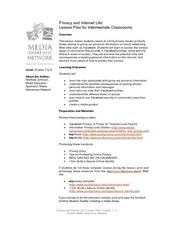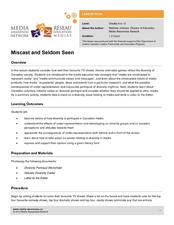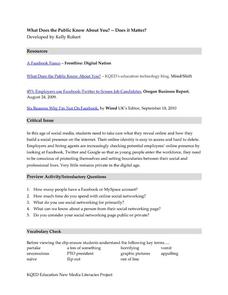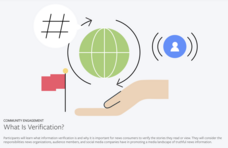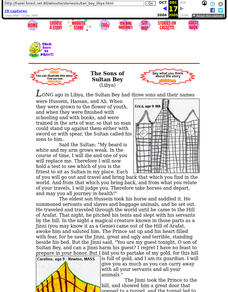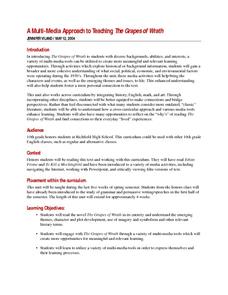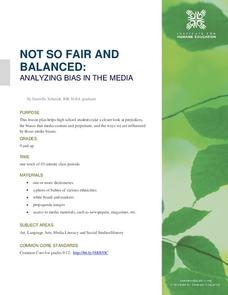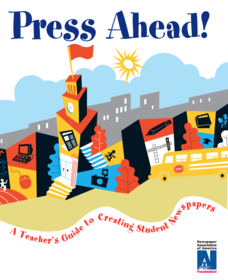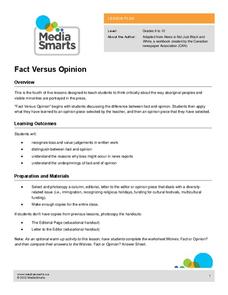Newseum
The Fundamentals of News
A short video introduces middle schoolers to different media-related news terms. Viewers then complete a worksheet and discuss the differences between news and journalism, between facts and opinions.
profitt.gatech.edu
Effective Communication: Listening, Speaking, Writing, Interpreting
Help young learners become active listeners and strong public speakers with a set of activities that range from paraphrasing, to discussions, and self-reflection. Additionally, the lessons address social media skills and non-verbal...
News For Kids
News For Kids.net
Media lovers read articles on a variety of current events with a website made especially for kids. The website is easy to navigate and includes sections about everything from science to sports.
iCivics
Propaganda: What’s the Message?
As class members progress through eight fully prepared learning stations, they will identify how bias is present in persuasive media, as well as differentiate among types of propaganda techniques like bandwagon propaganda and the use of...
Constitutional Rights Foundation
Understanding Fake News
Fake or fact? Learners must decide while looking at two published "news" stories. A reading about why fake news exists and a checklist on how to evaluate sources rounds out the activity.
Curated OER
How Media Shapes Perception
Young scholars explain the impact that the media may have in shaping their intellectual and emotional responses to current events. They examine broadcast and Web-based news sites to find subtexts through the use of language, audio, and...
Curated OER
Real Life Or Broken Mirror? Examining Media Representations of Teenagers
Learners analyze representation of teenagers in the news and other media, discuss importance of media literacy in interpreting media portrayals of reality, and discuss and write about accuracy, or lack thereof, of media images of young...
Media Smarts
Gender Messages in Alcohol Advertising
Make your students critical consumers of media, and foster an awareness of how culture is reflected and shaped by media. This resource covers how alcohol advertising presents and promotes gender stereotypes. After a discussion on...
Curated OER
Privacy and Online Life: Protect Yourself
Help your class protect privacy, security, and their online profiles with this examination of social media, especially Facebook, and who can see what about each of us. Resource contains useful links for learners to conduct their own...
Curated OER
Miscast and Seldom Seen
Consider how well high schoolers' favorite TV shows, movies and video games reflect the diversity of society. The instructional activity introduces your class to several media literacy concepts, such as how media conveys values and...
Curated OER
What Does the Public Know About You? --Does it Matter?
Young people today have to be very careful with how they present themselves online. Show them the possible impact of their online activity and what employers might see when performing a basic search. The lesson provides a video clip...
Curated OER
Linking Social Networking to Language Arts
How to tap into students' social networking experiences to enhance learning in the language arts classroom.
Curated OER
What Famous Landmarks Have You Visited?
Responding to blog posts can increase written communication skills, critical thinking skills, and the use of social media as a means for discussion. Kids will compose a blog post in response to the provided article related to famous...
Facebook
What Is Verification?
One of the most important skills news consumers and social media users must develop is the ability to determine the veracity of stories they read or view. Here's an interactive lesson plan that teaches high schoolers how to verify news...
Curated OER
The Sons of Sultan Bey (Libya)
Imagine you could increase reading comprehension and social media skills at the same time. Learners can read and then respond to the tale "The Sons of Sultan Bey." Their comments are guided by comprehension-style questions and can be...
Michigan State University
Researching and Compiling Survey Information
Bring Internet research and social issues to your language arts class in this activity. After investigating the topic "Media Violence and How It Affects Teenagers" on the Internet, middle schoolers work in groups to compile their...
Curated OER
Stonewall and Beyond: Gay and Lesbian Issues
Help learners understand their own biases and how their perspectives may have been influenced by biased media sources. They keep a journal while viewing videos, exploring websites, and engaging in class discussions related to gay and...
Curated OER
A Multi-Media Approach to Teaching The Grapes of Wrath
Integrate history, math, and art into a study of The Grapes of Wrath with a series of activities that ask learners to investigate the social, political, economic, and environmental factors at play during the 1930s. Designed to be used...
Curated OER
Grapes of Wrath: Setting up Historical Context
Discuss life in the 1930s in relation to the Dust Bowl and Great Depression, then do a cross-media analysis. Here you'll find background information on film maker John Ford, writer John Steinbeck, and 1930s America. You can compare the...
Curated OER
Valuing Different Views: Taking a Stand on Media Violence
Students recognize the value of multiple perspectives and differences of opinion. They build empathy and open-mindedness for other points of view. They study the complexity of social and cultural issues such as violence in media.
Media Smarts
Challenging Hate Online
Looking at the different ways organizations disseminate their messages using digital media leads to developing a digital anti-hate media campaign. Although some of the resources reflect the Canadian developer, the links provide...
Institute for Humane Education
Not So Fair and Balanced: Analyzing Bias in the Media
Life is not always fair. Who's heard that before? This same concept moves to a larger scale using prejudice and bias. Pupils discuss where prejudice attitudes derive and how they develop throughout life. Reading comprehension...
Newspaper Association of America
Press Ahead!
Give class members some great news! A media unit teaches individuals about ethics, parts of a newspaper, business writing, photojournalism, and more topics that have to do with the press. Full of material for a variety of learners,...
Media Smarts
Fact versus Opinion
Part of a series aimed at breaking down cultural bias from the Canadian Media Awareness Network, this activity identifies where opinions do and don't belong in a newspaper. Pupils review handouts about the purpose of editorial comments...










